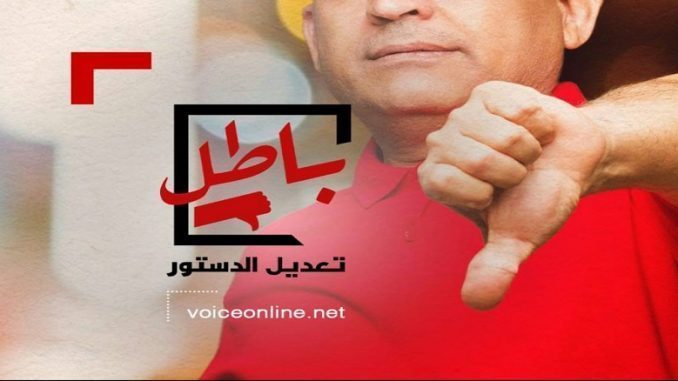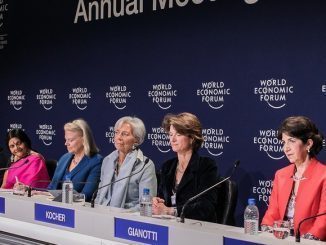
Abdel Fattah Al-Sisi blocked access to opposition websites, introduced draconian penalties and vowed to punish journalists ahead of vote
As the world watches the peaceful revolution that is changing Sudan in awe and amazement, it is clear that in Egypt, Sudan’s neighbor to the north, Sisi is getting nervous. On the same day as the protests in Khartoum reached a head, several of us who oppose Sisi’s autocratic rule launched an online petition to declare any result from Tuesday’s referendum on proposed constitutional amendments; “void”.
Amongst the amendments which Sisi is trying to force on the Egyptian people is a provision which could allow him to remain in power until 2034. The amendments would also increase the control of the military who would be given powers to police the political sphere in Egypt. They would also give Sisi control over the appointment of judges and the public prosecutor.
These amendments are to be voted on by the people in a referendum, but there is no one who believes that this would be anything close to free or fair. Sisi is desperate to overstay his welcome in power and it is for this reason that we have decided to run a “shadow” referendum, to show the true will of the Egyptian people.
No one who believes that this would be anything close to free or fair. In typical Sisi fashion, the website was blocked in Egypt after reaching 60,000 signatures in the first few hours of its launch. The voting was then moved to encrypted messaging app Telegram. Even then, Sisi’s team were able to block access, which lead to another page being created. It has now become a cat and mouse chase to block and re-open websites. All the while there are now over 100,000 signatures and the apparent full force of the Egyptian Government is not able to fully silence the true will of the people.
In fact, only a few weeks earlier another wave of discontent flooded Egyptian social media through the “You are not Alone” hashtag. It was started by Motaaz Matar an Egyptian opposition journalist working from a TV station based in Turkey. He called on people to tweet with the hashtag #اطمن_انت_مش_لوحدك (Be assured, you are not alone), and within a few hours it spilled over the border and became the top trending hashtag in Egypt, Algeria, Qatar and Jordan.
Everyone from opposition leaders to other journalists, foreign politicians and just regular people joined in, prompting the Sisi regime to respond with extreme violence and targeting those participating in the campaign.
The Parliament issued a new amendment to the already-draconian anti-terror law, declaring that the penalty for writing any “extremist” idea online, or inciting action against the state would be increased from five years to 10 years imprisonment.
But Sisi’s online war began long before the Void and You Are Not Alone campaigns.
Indeed, before the revolution in 2010, when he was a director of military intelligence, he said in a seminar with the Egyptian military that “social media will have a critical impact on Egypt and our region.”
He made sure to act swiftly on this. In 2014, before the presidential elections that followed the military coup, the UAE paid 10 million euros to buy a spyware program from a French company, Nexa technology. The UAE gave this program to Egypt to facilitate monitoring, tracking and hacking of opponents’ social media accounts.
Soon after a large number of Egyptian opposition activists were arrested.
In May last year, Sisi angrily announced that, “all the people who oppose [Egypt] from TV stations based abroad, I swear they will be punished”. He was issuing a clear threat to all journalists and activists who are working in TV stations abroad, myself included.
It was following this threat that he began to impose much stronger restrictions and control on what is published online. The social media accounts of activists were monitored and tracked. Many such as Wael Abbas a prominent blogger were then arrested and charged with publishing “rumors”, insulting the president, or spreading a pessimistic atmosphere in Egypt.
Amnesty international released a report on 6 March 2019 that said Egypt had targeted dozens of human rights defenders with cyber-attacks. They found that the attacks occurred between 13 and 18 January 2019 and increased significantly on 29 January, during a meeting between opposition activists and French president Emmanuel Macron.
But outrage is growing against the repression by Egyptian authorities. An increase in the detention of political prisoners is making social media more appealing than ever to Egyptians and especially to the opposition.
Indeed, whatever it is that Sisi and his regime are trying to achieve by curbing social media use, targeting activists and even changing the constitution, seems to have had the complete opposite effect. Social media is more buzzing now than ever. Blocking websites increases the desire to reach them; targeting social networking sites encourages their users to devise more ingenious and effective means to use them to their advantage; and arresting activists pushes their friends to blog more about them.
I sometimes wonder if Sisi and his regime realise we are living in 2019. No matter how hard they try, we will always find a voice to express our discontent, whether it is on the streets or online, he cannot silence us.
*By Osama Gaweesh, an Egyptian TV presenter living in exile in the UK. The article was published on The Guardian on 16 April 2019.



